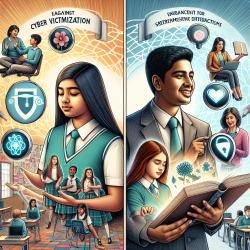Introduction
The COVID-19 pandemic has reshaped many aspects of healthcare delivery, including how we address social isolation among patients. A recent study titled "Reducing social isolation during the COVID-19 pandemic: Assessing the contribution of courtesy phone calls by volunteers" highlights an innovative approach to mitigating isolation through volunteer-led courtesy calls. This blog explores how practitioners can enhance their skills by implementing insights from this research.
Research Insights
The study conducted at the Centre hospitalier de l’Université de Montréal (CHUM) involved over 11,800 courtesy phone calls made by volunteers to hospitalized patients. The primary aim was to reduce feelings of isolation during the pandemic when in-person visits were restricted. The results were promising: 64.5% of patients reported feeling less isolated, and 73.6% felt their needs were met by these calls.
Practical Applications for Practitioners
Practitioners can draw several key lessons from this study to improve patient outcomes:
- Adopt Technology for Connection: The use of phone calls, and potentially video calls, can be an effective tool for maintaining patient interaction, especially when face-to-face meetings are not feasible.
- Train Volunteers Effectively: Providing volunteers with adequate training and support ensures they can effectively engage with patients and address their emotional needs.
- Build Trust and Continuity: Assigning the same volunteer to a patient can foster trust and provide continuity, enhancing the therapeutic relationship.
- Expand Beyond Pandemics: Consider maintaining such initiatives beyond the pandemic to support patients who are isolated for medical reasons.
Encouraging Further Research
While the study offers valuable insights, it also opens avenues for further research. Practitioners are encouraged to explore:
- The long-term effects of courtesy calls on patient mental health and recovery.
- The potential for integrating technology, such as smartphones, to enhance the quality of interactions.
- Strategies to personalize volunteer-patient interactions to maximize therapeutic benefits.
Conclusion
Courtesy calls by volunteers have proven to be a valuable intervention for reducing social isolation among hospitalized patients. Practitioners can leverage these findings to enhance patient care and explore new ways to integrate volunteer support into their practice. By doing so, we can create more resilient healthcare systems that prioritize patient well-being.
To read the original research paper, please follow this link: Reducing social isolation during the COVID-19 pandemic: Assessing the contribution of courtesy phone calls by volunteers.










